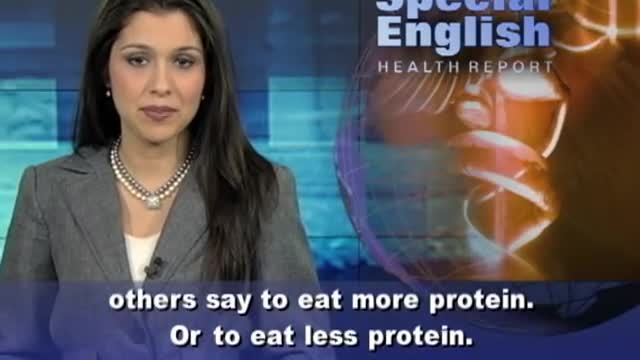Premium Only Content

Want to Lose Weight? Try Counting Calories
How many calories we eat appears to be more important than what we eat when we eat too much. That was the finding of a new study that should be satisfying to anyone who counts calories for weight control.More than one billion adults are overweight. The World Health Organization calls obesity a global epidemic. Government researchers have just reported their latest estimates for the United States. The good news: obesity rates have not increased much in recent years. The bad news: they have not decreased either. More than one-third of adults were obese in two thousand nine and two thousand ten. Anyone who has ever tried to lose weight knows there are all kinds of conflicting diet plans. Some tell people not to eat carbohydrates. Others say not to eat fats. Still others say to eat more protein. Or to eat less protein. Dr. George Bray at the Pennington Biomedical Research Center in Louisiana led the new study. He wanted to know if protein affects weight gain. Twenty-five healthy adults were in the study. They were overfed by almost a thousand calories a day over an eight-week period. Calories in food are a measure of energy. The people followed diets with low, normal or high levels of protein. Normal was defined as fifteen percent of energy from protein. Dr. Bray says all of them gained weight: "Fat storage was exactly the same with all three levels of protein. It was the calories that they ate that affected the body fat that they stored." Those who ate a higher percentage of protein gained more lean body mass. Dr. Bray says the opposite happened on a low protein diet: "If your protein intake's low, you'll actually lose body mass even though you're eating an excess amount of calories."He tells his patients to weigh themselves regularly so they can know quickly if they gain weight. His study appeared in the Journal of the American Medical Association.Dr. Dariush Mozaffarian at the Harvard School of Public Health studies the relationship between diet and conditions like heart disease and diabetes. He says, "We don't need to go down a list of 'avoid this, avoid that' -- become, you know, food police. It's really actually mostly foods that should be increased. It's fruits, vegetables, whole grains, fish, vegetable oils and nuts." He says increasing these six foods by about one serving each day would reduce obesity and help slow the epidemic of obesity-related diseases.For VOA Special English, I'm Alex Villarreal.You can find a video about the study at voaspecialenglish.com.
-
 4:25:53
4:25:53
Nerdrotic
7 hours ago $23.78 earnedMarvel Is SCREWED | Daredevil Afterbirth | G20 is ABSOLUTE Cinema - Friday Night Tights 349 w MauLer
102K23 -
 56:03
56:03
BonginoReport
6 hours agoICE Boss Wants Deportations To Run like Amazon Prime - Nightly Scroll w/Hayley Caronia (Ep.25)
107K56 -
 45:12
45:12
Sarah Westall
3 hours ago“Most Important Story of the Decade” Globalists Move to Fund World Gov w/ Alex Newman & Sam Anthony
34.4K12 -
 16:23
16:23
China Uncensored
4 hours agoChina STRIKES BACK Against Trump Tariffs
18.6K2 -
 13:52
13:52
Tundra Tactical
4 hours ago $0.71 earnedDOJ's 2A Task Force: Too Little Too Late?
15.6K3 -
 8:32
8:32
Colion Noir
10 hours agoCaught on Camera: Armed Florida Home Owner Uses Shotgun Against Burglar
28.1K12 -
 1:55:44
1:55:44
2 MIKES LIVE
6 hours ago2 MIKES LIVE #204 Open Mike Friday!
23.9K -
 54:04
54:04
LFA TV
10 hours agoTrump Gives Israel the Obama Treatment | TRUMPET DAILY 4.11.25 7PM
21.5K19 -
 1:13:38
1:13:38
Kim Iversen
7 hours agoYou're Being Lied To — Even by 'Independent' Media | Will John
109K77 -
 1:39:52
1:39:52
vivafrei
12 hours agoMeth Labs Busts in Canada! More Chinese Election Interference? Cross-Fire Hurricane Scandal & MORE!
120K94